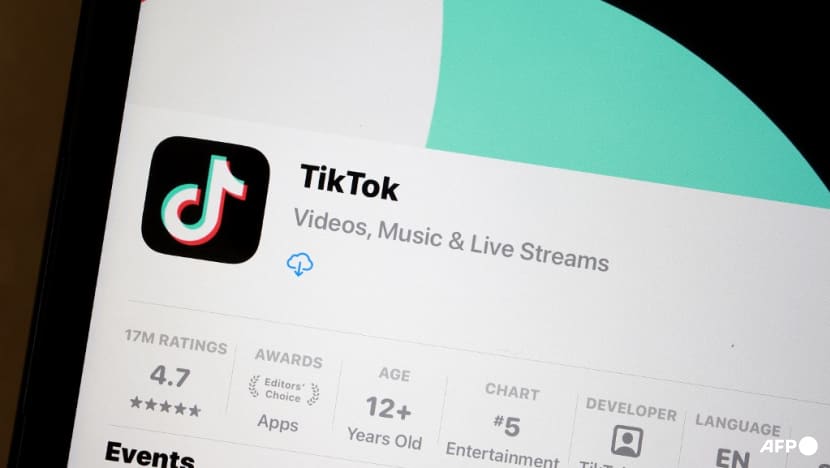Commentary: Even if TikTok is banned in the US, its users will find alternatives
The uncertainty over a possible TikTok ban in the lucrative US market could extend to multiple years, says NTU associate dean Mark Cenite.

The TikTok app is displayed on an iPhone screen on Apr 24, 2024. President Joe Biden signed a foreign aid package that includes a Bill that would ban TikTok if China-based parent company ByteDance fails to sell the app to an American company within a year. (Photo illustration by Joe Raedle/Getty Images via AFP)

This audio is generated by an AI tool.
SINGAPORE: This week, US President Joe Biden signed a Bill that forces TikTok’s China-based parent company, ByteDance, to sell its US operations or face a ban on operating in the United States.
Even if the ban never materialises, TikTok may soon face a test of its users’ loyalty.
The clock has started ticking. To prevent a ban, a sale to a buyer outside China must close in nine months, by January 2025.
Alternatively, if the winner of the presidency in November certifies that there is “significant progress” toward divestiture, a three-month extension is possible. The timeframe, longer than the six months prescribed in an earlier Bill, means no ban could take effect until after the elections. That undoubtedly was a selling point for lawmakers on the ballot.
A year of uncertainty about a possible ban in the lucrative US market could extend to multiple years. Content creators and users would be wise to explore alternatives. In the process, they may find that the platform is not as special as it seems.
COURT CHALLENGES
Legal challenges and appeals could pause the clock on the platform’s future for years.
TikTok’s Singaporean CEO, Mr Chew Shou Zi, said on Apr 24 in a video, “We will keep fighting for your rights in the courts. The facts and the Constitution are on our side, and we expect to prevail.”
As an American, it felt dizzying to hear a Singaporean defending Americans’ free speech rights and vowing to litigate to prevent a company with Chinese origins from being censored in the US.
TikTok’s First Amendment challenge, which civil liberties groups might join, would aim to convince a court to overturn the law for restricting speech based on its content.
Indeed, the Bill’s supporters cited concerns that Beijing could pressure ByteDance to use its subsidiary’s platform to spread propaganda to US users, especially in a US-China crisis. But First Amendment rulings have protected Americans’ right to access foreign propaganda freely.
A legal challenge may fail, however, if courts interpret the law as regulating the company’s conduct but only having the incidental effect of banning expression.
Courts could construe the statute as prohibiting the Chinese government from collecting user data for “traditional espionage operations”, which Federal Bureau of Investigation director Christopher Wray claims are possible on TikTok.
OBSTACLES TO A SALE
A sale still seems unlikely if the law survives the courts’ scrutiny.
In 2020, when Donald Trump attempted to use an executive order to ban TikTok, ByteDance began discussing a sale. However, the Chinese authorities intervened by making the export of algorithms subject to government approval.
Without the recommendation algorithm trained on our countless moment-by-moment choices, a sale only of TikTok’s user base, content and infrastructure would be less appealing.
Finding a willing buyer who could afford the platform’s estimated US$100 billion price tag may be difficult. Meta and Alphabet, already under antitrust scrutiny in America and the European Union, are unlikely to incur further legal risk.
Among potential buyers who expressed interest earlier were software giant Oracle, which is a TikTok partner, and Microsoft. Also assembling possible teams of investors are President Trump’s former treasury secretary, Steve Mnuchin, and the former CEO of the gaming giant Activision Blizzard, Bobby Kotick.
In any case, the Chinese commerce ministry said in March 2023 that it would oppose the sale of TikTok. So, a US ban may be inevitable once the law takes effect.
WHAT WOULD TIKTOK USERS DO?
If implemented, a ban means Americans could still use a previously installed version of the app on a device but couldn’t download or update it from app stores.
Of course, they could use a Virtual Private Networking (VPN) service to make it appear that they were not in the US. Relatively few Americans routinely use VPNs, however, and they may be unlikely do so for a single app.
I discussed a potential ban with students in my course on the law of artificial intelligence at Nanyang Technological University, and their answers don’t bode well for TikTok.
Does it matter if Americans stay on TikTok? Almost all my students, primarily Singaporeans but hailing from around the world, said it mattered.
TikTok’s 170 million American users constitute a minority of the platform’s 1 billion users, but they are the largest group from any nation. A disproportionate number of them are prominent creators.
Would my students use TikTok less if Americans defected in droves? Most said yes, as they predicted the centre of young people’s social media universe would shift away from TikTok.
Where would they go? My students’ views echoed a recent national survey of American users and creators who said they would migrate to Meta’s Instagram Reels and YouTube Shorts, both short-form video platforms with algorithmic feeds. Instagram Reels benefited when India banned TikTok in 2020 because of a border dispute with China.
TIKTOK IS NOT IRREPLACEABLE
Another question I asked my students: Is TikTok unique, or could another service replace it?
Few felt it was irreplaceable. Students said their loyalties are to creators, not the platform. Some already follow their favourite influencers on multiple platforms, typically TikTok and Instagram Reels.
US creators who make a living on TikTok are understandably reluctant to test whether their fans would follow them to another platform. They have spoken out against the legislation, while many are establishing followings on multiple services.
Right now, some users perceive TikTok as superior to alternatives. To what extent is that because of its recommendation system or simply the critical mass of users? Speculation abounds. TikTok has been famously secretive about its algorithm.
There’s little evidence that TikTok’s algorithm is unique. Any perceived advantage may come from the communities already established there and the richness of the content they post.
An algorithm learns from data and will likely improve at making the predictions that keep us glued to our screens. Any deficits of TikTok rivals like Instagram Reels may be quickly remedied as its algorithm trains on more user data and content.
Even if a ban never materialises, TikTok may face a reckoning. Just over a decade ago, Facebook was where the social media action was, but younger generations aren’t heavy users.
Now, glued to TikTok, they may not share American lawmakers’ suspicions of the platform, but they won’t stick around if it loses its edge. And given that each cohort of young people wants to forge its own community, newcomers to social media may be eager to move on to new platforms.
Dr Mark Cenite is Associate Dean (Undergraduate Education) at Nanyang Technological University’s College of Humanities, Arts, & Social Sciences. He teaches media law and artificial intelligence law at the Wee Kim Wee School of Communication and Information.




















